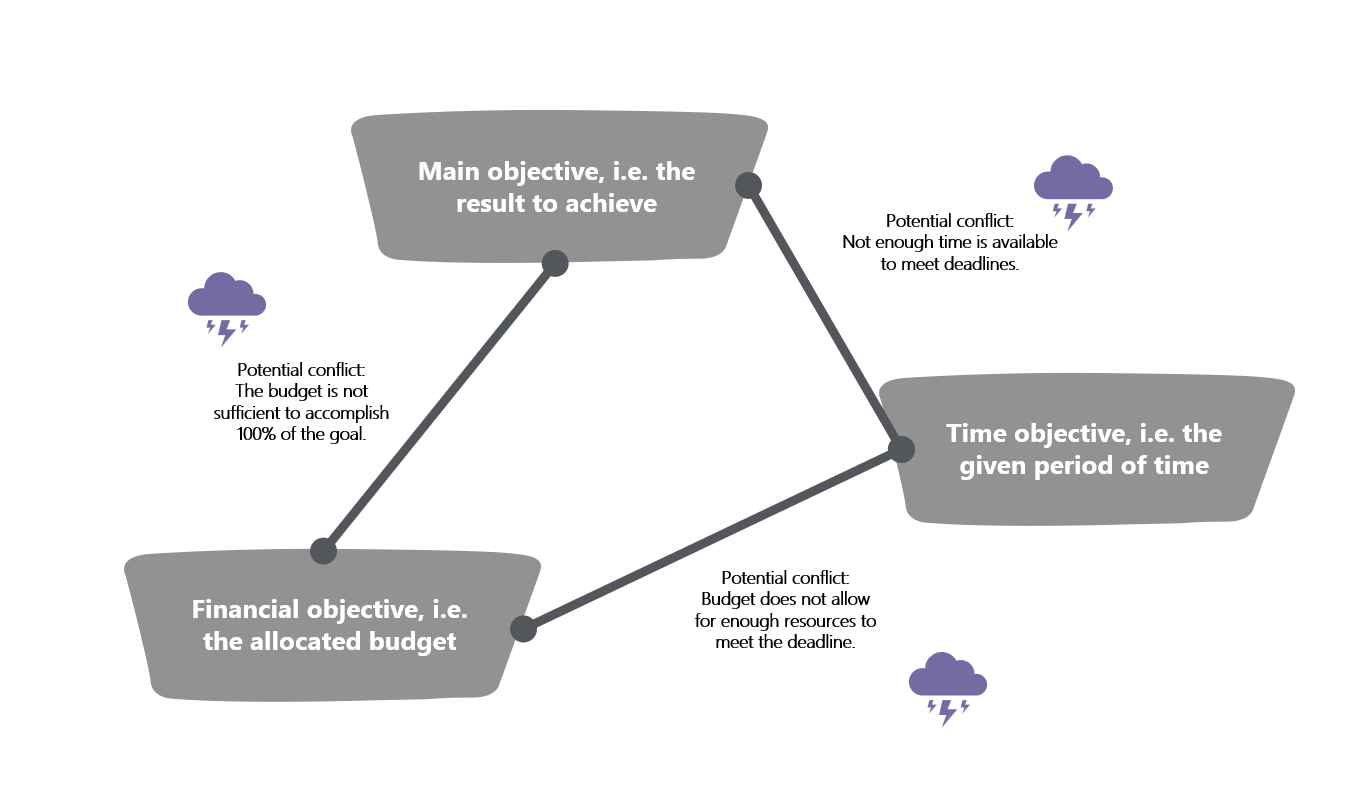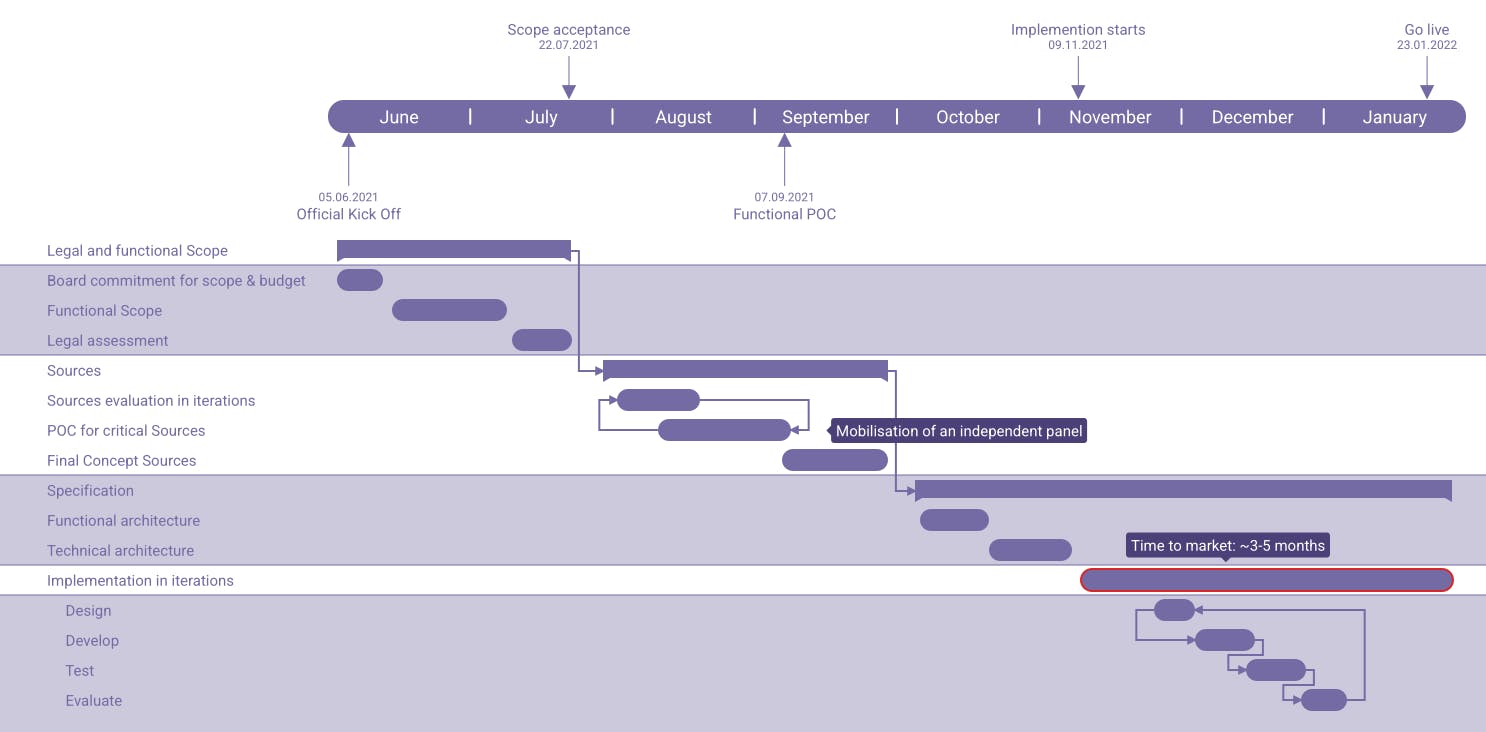Do you do project management?

First of all, what defines a project?
Nowadays, the term "project" is used extensively. But what is a project after all? Some describe it as complex processes, time-consuming activities, or resource allocation calculations, while others focus on certain methodologies or collaboration. You too have the answer, but when it comes to finding the right words to explain what it means, you may feel that words are lacking.
So let's try to work out what constitutes a project... from the very beginning to the very end.
First and foremost, a project is a set of objectives: one must achieve a certain result with a given level of quality by a certain date within a given budget. These three types of objectives can be contradictory:

Depending on the situation, there may be so-called collateral objectives, such as the respect of certain framework conditions or the coordination with other projects.
Once the objectives have been defined, it is important to start planning. A distinction is made between grouped tasks, individual tasks, and milestones. This is where a software program such as gantt.io can be of great value. It makes it possible for everyone to visualize the course of the project in a clear way, even for people who do not understand anything about project management:

Finally, and sadly, tasks don't get done on their own - someone has to do the work. That's why planning, allocating and tracking resources is the third discipline of project management. It is just as important as managing the objectives and planning the activities.
Project management applies not only to the work environment but also to our daily lives. Whether you are implementing new data management software in your company or organizing a birthday party for your extended family, you have the same goal: that all steps are successfully completed on time and that all objectives are met.
The project manager's mission
If you ask a project manager what he or she does and he or she answers: "oh, I just get things done...", then you are dealing with a modest person. Project management includes a multitude of aspects such as "organization", "deployment", "planning" and "orchestration of various resources", to name a few.
We mentioned earlier that project management includes, among other things, the allocation of available resources. These include the collaborators assigned to projects, machines, equipment, rooms, and other elements that are available in limited quantities.
Once these elements are specified, as well as the starting point (e.g. the current situation), the final objective, and the path to take in order to reach the goal, the team will be able to mobilize and "start the machine" that will allow accomplishing one task after the other.
The importance of communication and taking the human factor into account
In complex environments, project management brings clarity, transversality, fluid communication, an overall vision, and a sense of responsibility to each person involved. In addition, thoughtful and proactive management ensures the achievement of objectives and a return on investment for the company. Pretty good, right? But it's not a piece of cake, hence the importance of the role of a project manager!
In addition to the responsibilities listed above, a project manager may have to create and implement processes, unify the vision of the project's stakeholders and manage the different resources available to avoid exceeding the budget while respecting the time constraints.
Here are some examples of activities that a project manager will have to do:
- Create a solid action plan
- Evaluate the costs
- Create a schedule of tasks to be performed
- Adjust the schedule if necessary
- Monitor resource utilization and adjust as needed
- Communicate quick wins as the project progresses
- Manage risks
- Motivate and encourage the project team
- Etc.
Are there any qualities that distinguish a good project manager?
There certainly are! A good project manager is someone who has a strong sense of leadership and resilience, has clear, measurable, and realistic goals to keep the team motivated, and possibly the most important element, cares about the well-being of the people on the team. The project team is a powerful engine that puts considerable effort into the success of the whole.

Whether you are already in the business or considering it for your future, whether you have made it your "livelihood" or you are doing it on your own time for your personal interest, managing a project can sometimes be complex, but it is often rewarding and fulfilling!
And you, what will your next adventure be like?
Illustrations by Storyset